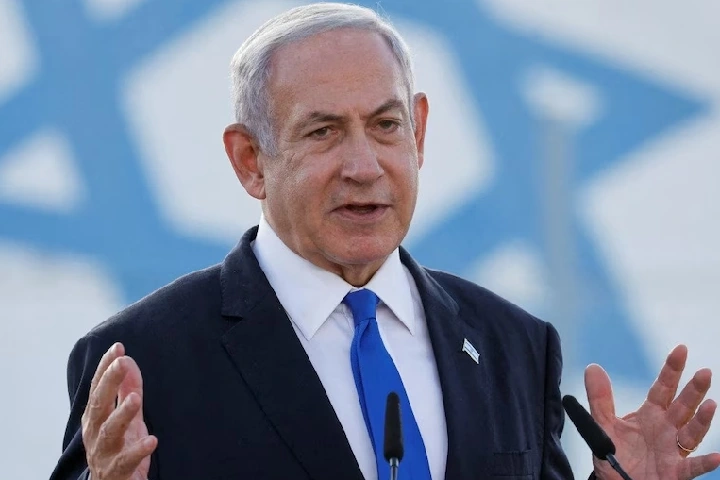

So far, Netanyahu has delayed the IDF's plans to invade the densely populated southern part of the Gaza Strip, where most of the Hamas leadership and command are believed to be hiding.
As efforts are being employed for extending truce in the Gaza war that has specifically been put in place for exchange of Palestinian prisoners and Israeli hostages, the future of the conflict and its implications for Israeli Prime Minister Benjamin Netanyahu are also in focus. Netanyahu has declared he would decimate Hamas, the principal nemesis of Israel, which, upon survival, will have to be adjusted by Israel for long-standing regional peace. Otherwise, Tel Aviv has to be prepared for clashes with the armed group that have been a regular feature since 2000.
In either case, Netanyahu’s political future will be devoured, and along with him those of his right-wing coalition partners.
The operational objective of the Israeli Defence Forces after October 7 attacks was to dismantle the Hamas fighting force into atomised entities that would be unable to endanger Israel. In addition, the IDF was commanded to ensure that top commanders of Hamas should not survive the first month of blitzkrieg.
However, according to press reports, including those of Israeli media organisations, the results of the first phase of the IDF campaign show that achieving this is far from simple. Hamas has lost troops and commanders, but not enough to lose control of its forces, or show signs of capitulation. Its immense tunnel array appears to have been only very partially damaged.
By Thursday evening, calls for turning the temporary truce into a permanent ceasefire were going shrill, with some reports indicating that the administration of US President Joe Biden was in its favour.
The Biden administration is also in favour of Mahmoud Abbas-led Palestinian Authority to take over Gaza and expel all Hamas fighters.
This position contrasts with that of the Netanyahu-led Israeli war cabinet.
Netanyahu is openly vocal against the return of the Palestinian Authority to the Gaza Strip or as a partner in peace talks. Any retreat from this position will lead to the withdrawal of the far right from the government, he fears, and the end of the “fully right-wing government.”
So far, Netanyahu has delayed the IDF’s plans to invade the densely populated southern part of the Gaza Strip, where most of the Hamas leadership and command are believed to be hiding. This is, according to analyst Ben Caspit, owing to mounting pressure on Americans to halt the Gaza war and also because of Netanyahu’s Likud plunging lower in latest ratings.
Meanwhile, the Times of Israel quoted Netanyahu as saying on Wednesday that the war to destroy terrorist Hamas will resume as soon as an ongoing process to secure the release of hostages held captive in the Gaza Strip comes to an end. His vow to continue the fight was echoed by the other two members of the war cabinet, Defense Minister Yoav Gallant and Minister Benny Gantz.
In a statement, Netanyahu said that destroying Hamas was still a prime objective along with returning hostages to Israel.
“From the beginning of the war, I set three goals: the elimination of Hamas, the return of all our abductees, and to ensure that Gaza will never again be a threat to Israel,” the prime minister said. “These three goals remain in place.”
Under the terms of a temporary truce in Gaza, Hamas has every day released about 10 Israeli women and children held captive, in return for Israel pausing its offensive and allowing additional humanitarian aid into the Gaza Strip. Israel has also released three Palestinian security prisoners held in prisons in exchange for each hostage set free.
The truce, which began last Friday, was approved by the cabinet to stretch to up to 10 days if Hamas continues to release hostages.
The decision about elongation of truce is likely to be decided on December 1. The decision, observers believe, could make the fate of Gaza clear whether it will go the Netanyahu way or the reconciliatory path spelled out by the world, led by the US.
Aluf Benn, a senior columnist for Haaretz, captured the conundrum for Netanyahu: “In the very next few days, Netanyahu will have to decide between two options: To follow Gallant and Halevi in another round against Yihya Sinwar of Hamas in Gaza, while mustering American consent in return for a discussion of ‘the day after.’ Or to return to what has been his tendency for many years, and fizzle out the fighting through a series of pauses and exchange deals – as long as he doesn’t have to make any move toward the Palestinians that would dismantle his coalition and send him home.”
The Bharat Sanchar Nigam Limited (BSNL) has announced the soft launch of BSNL Quantum 5G…
The Indian Embassy in Iran has said that the embassy will make efforts to evacuate…
India's gross direct tax collections for the financial year 2025-26 rose by 4.86 per cent…
Russian President Vladimir Putin has said that Moscow is not seeking Ukraine's unconditional surrender, but…
Extending his greetings on the 11th International Day of Yoga, Lok Sabha speaker Om Birla…
Ministry of External Affairs (MEA) official spokesperson Randhir Jaiswal said that so far, 517 Indian…